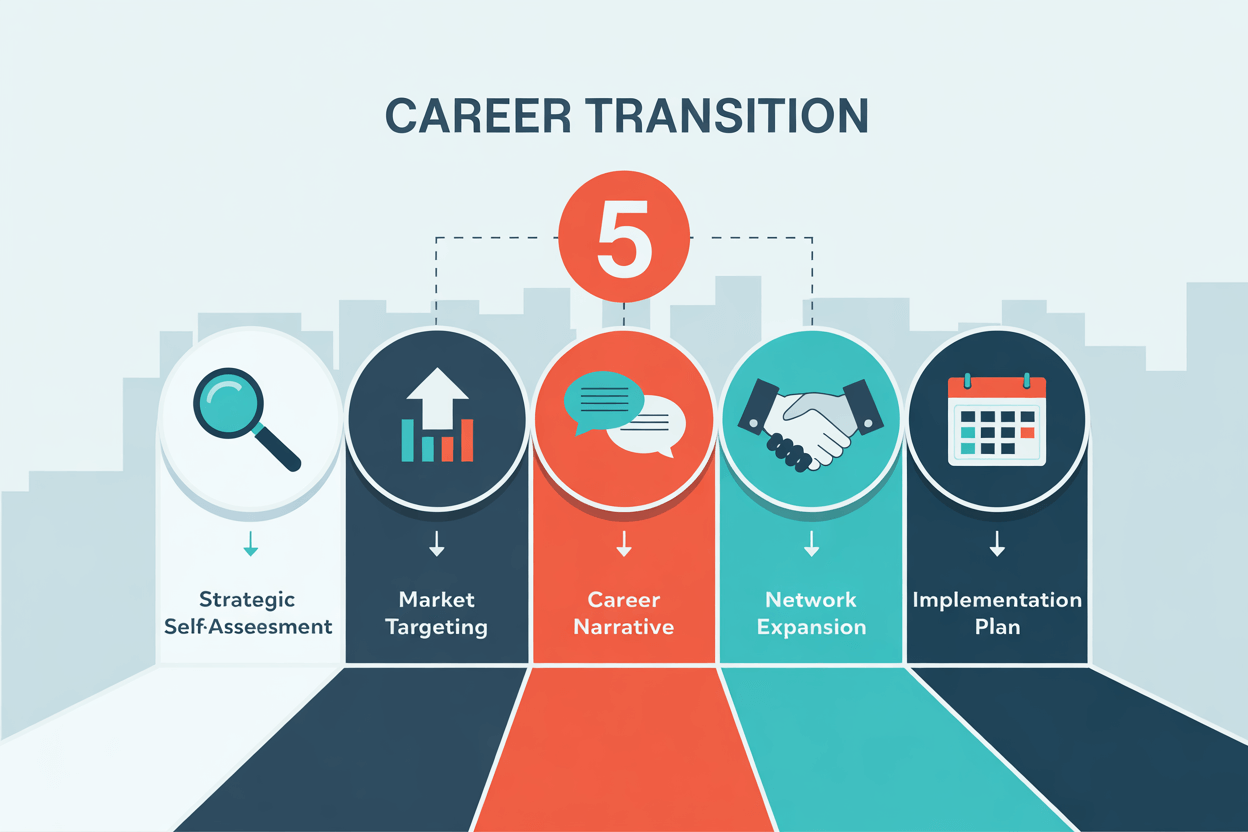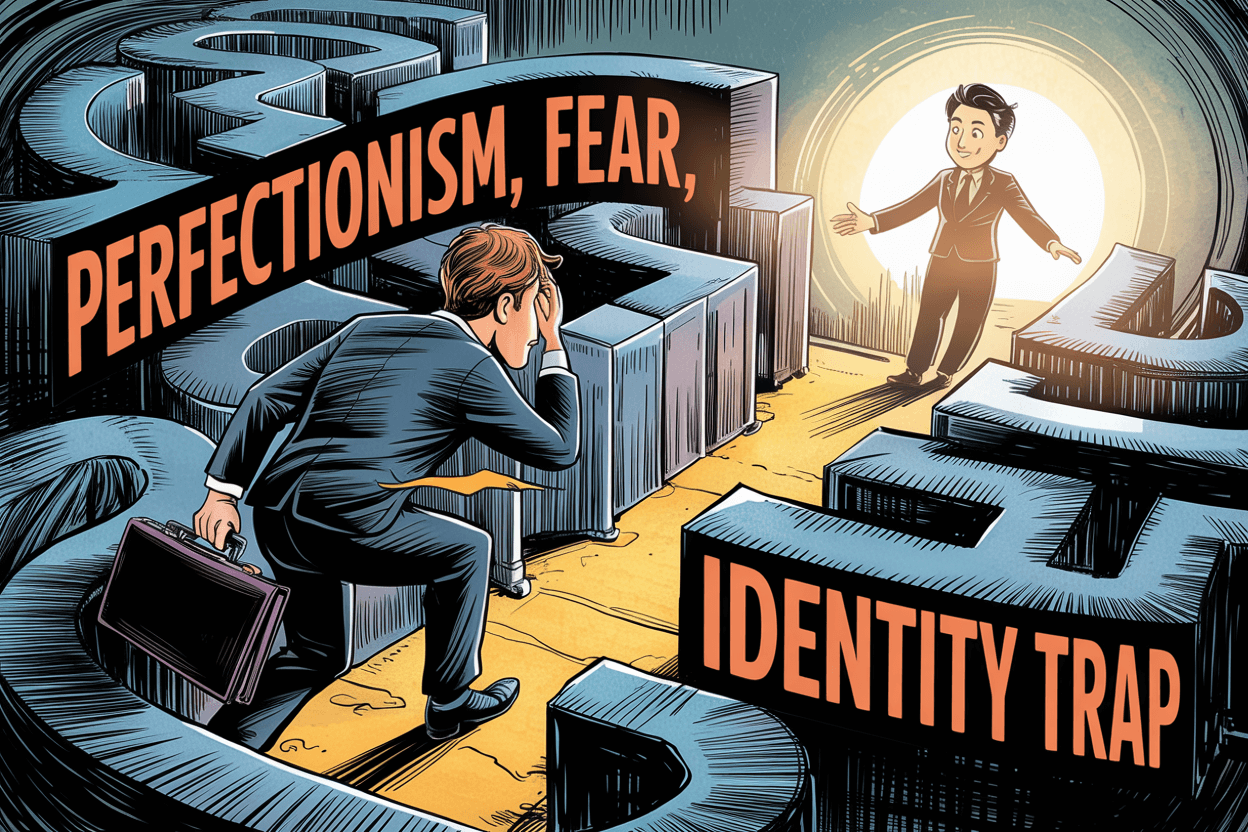Mid-career transitions represent both incredible opportunities and unique challenges, particularly for professionals in their 40s and beyond in the UK!
Did you know that 63% of UK professionals over 40 contemplate a significant career change, yet only 22% successfully navigate this transition without structured support?
I’m Trip Saggu, and I’ve developed a framework that turns uncertainty into opportunity. Whether you’re feeling stagnant, undervalued, or simply ready for change, this guide will show you why career coaching is the critical difference between wishful thinking and successful reinvention.
Why Mid-Career Changes Are Different in Your 40s
Changing careers at 40+ in the UK presents unique considerations that younger professionals don’t face.
The Distinctive Challenges of Later Career Transitions
Mid-career professionals navigating change typically encounter:
- Established financial commitments: Mortgages, school fees, and retirement planning create different risk parameters
- Industry perception: Battling unconscious age bias in specific sectors requires strategic positioning
- Identity integration: Reconciling decades of professional identity with new aspirations
- Transferable skills recognition: Ensuring your valuable experience translates across industry boundaries
As my client James, a former finance director who successfully transitioned to sustainability consulting at 46, reflected: “I wasn’t starting from scratch—I had 20+ years of valuable experience. The challenge was articulating how that experience translated to an entirely new field. Trip helped me reframe my narrative in a way that made my transition feel like a natural progression rather than a radical departure.“
The Unique Advantages You Bring
While the challenges are real, mid-career professionals possess significant advantages:
- Depth of experience: You’ve developed nuanced problem-solving capabilities
- Established professional networks: Even in new fields, your connections remain valuable
- Emotional intelligence: Your interpersonal skills are typically far more developed
- More transparent self-knowledge: You understand your strengths, weaknesses, and values with greater clarity
These advantages become powerful assets when properly leveraged through targeted career development coaching.
The 5 Critical Elements of Successful Mid-Career Transitions
Through my experience coaching hundreds of professionals through career changes, I’ve identified five crucial elements that determine success or failure.
1. Strategic Self-Assessment
Effective career transitions begin with honest self-evaluation. This goes beyond casual reflection to structured assessment of:
- Core transferable skills: Identifying capabilities with cross-industry value
- Achievement patterns: Recognising recurring themes in your career successes
- Value alignment: Clarifying what truly matters at this life stage
- Risk tolerance: Honestly assessing your comfort with change and uncertainty
A professional career coach provides objective assessment tools and feedback that reveal blind spots and opportunities you might miss independently.
2. Market-Informed Targeting
Successful career changers don’t just follow a passion—they strategically identify markets where their experience creates unique value.
This requires:
- Industry trend analysis: Identifying sectors with growth potential and openness to career changers
- Skill gap assessment: Determining additional qualifications or experiences needed
- Strategic positioning: Framing your background as an advantage, not a liability
- Compensation research: Setting realistic expectations for your transition phase
Sarah, a former retail executive who transitioned to healthcare administration at 43, noted: “Trip helped me identify a growing sector where my operational expertise would be valued despite my limited healthcare background. Rather than starting over, I was able to position my retail leadership experience as precisely what was needed to improve patient experience.“
3. Compelling Career Narrative
Perhaps the most crucial element of mid-career transitions is developing a coherent, convincing story that explains your change.
A compelling career narrative:
- Highlights continuity: Shows the logical progression in your career journey
- Emphasises transferable strengths: Focuses on capabilities rather than specific experience
- Addresses the ‘why now’: Proactively answers the inevitable question about timing
- Projects future value: Clearly articulates what you bring to the new field
Career coach from London guides you in crafting this narrative across your CV, LinkedIn profile, interviews, and networking conversations. This consistent, compelling story becomes your most powerful transition tool.
4. Strategic Network Expansion
At 40+, your network is wider and deeper than that of younger professionals. However, successful transitions require strategically expanding beyond familiar circles.
Effective networking for career changers involves:
- Targeted relationship building: Connecting with specific individuals in your target field
- Informational interviewing: Gathering insights while building relationships
- Reciprocal value creation: Leveraging your existing expertise to help others
- Strategic visibility: Positioning yourself in spaces where your target industry engages
With the right networking strategies, you can significantly accelerate your transition timeline and open doors that remain closed to traditional applicants.
5. Customised Implementation Plan
The final critical element is a detailed, realistic plan that bridges your current reality and desired future.
An effective transition plan includes:
- Financial preparation: Ensuring stability during your transition
- Skills acquisition strategy: Efficiently addressing knowledge gaps
- Timeline with milestones: Breaking the process into manageable steps
- Accountability mechanisms: Ensuring consistent progress despite obstacles
Through career coaching, you develop a plan tailored to your specific circumstances, with built-in flexibility to adapt as opportunities emerge.
Common Pitfalls in Mid-Career Transitions (And How to Avoid Them)
Understanding what doesn’t work is equally important as knowing what does. Here are the three most common mistakes I see mid-career professionals make:
The Identity Trap
Many professionals become so attached to their current identity that they limit their options unnecessarily. This manifests as:
- Defining yourself by your job title rather than your capabilities
- Dismissing opportunities that don’t match your previous status
- Struggling to articulate your value beyond your specific industry experience
Solution: Focus on the underlying skills and strengths that have made you successful, not the specific context where you’ve applied them.
The Perfection Paralysis
The belief that you need to be perfectly prepared before making a move is particularly common among successful mid-career professionals.
This appears as:
- Excessive research without action
- Pursuing unnecessary qualifications or certifications
- Waiting for the “perfect opportunity” that never materialises
Solution: Adopt an experimental mindset with iterative progress rather than seeking perfect preparation.
The Solo Strategy
Attempting to navigate complex career transitions alone significantly reduces your chances of success.
This mistake includes:
- Limiting your options to what you currently know
- Missing industry-specific opportunities and approaches
- Lacking accountability for consistent progress
Solution: Build a support system of mentors, peers, and professional coaches who provide guidance, accountability, and perspective.
How Career Coaching Accelerates Mid-Career Transitions
While self-directed career changes are possible, professional coaching dramatically improves your odds of success while reducing the time, stress, and financial impact of transitions.
Research shows that mid-career professionals who work with career coaches are 2.5 times more likely to successfully transition and report 40% higher satisfaction with their new roles.
Career coaching provides:
-
- Objective assessment: Identifying strengths and opportunities you might miss
- Market intelligence: Current insights into industry trends and opportunities
- Transition Expertise: Proven frameworks for career evolution
- Accountability: Consistent progress despite inevitable challenges
- Emotional support: Managing the psychological aspects of major change
As my client Robert, who transitioned from legal practice to leadership development at 49, shared: “What I didn’t expect was how much the emotional support mattered. Career change at this stage is as much a psychological journey as a practical one. Having Trip’s guidance through both aspects made all the difference.“

Taking the Next Step in Your Career Evolution
If you’re contemplating a career change in your 40s or beyond, you’re at a critical juncture. The decisions you make now will shape not just your professional satisfaction but your quality of life for decades to come.
As someone who has guided hundreds of professionals through successful transitions, I offer a complimentary Career Strategy Session for mid-career professionals serious about change. During this focused consultation, we’ll:
- Assess your current situation and aspirations
- Identify the biggest opportunities and challenges in your specific transition
- Outline potential strategies for your career evolution
- Determine if my coaching approach aligns with your needs
This session isn’t a sales pitch—it’s a genuine opportunity to gain clarity about your next steps, whether we work together or not.
Book your complimentary Career Strategy Session today
Remember, successful career transitions at 40+ aren’t about starting over—they’re about leveraging your valuable experience in new, fulfilling directions. With the right guidance, your next chapter can be your most rewarding yet.
Is it too late to change careers at 40 or 50 in the UK?
- Absolutely not. Many UK professionals successfully pivot in their 40s and 50s, bringing valuable experience, emotional intelligence, and leadership skills to new roles. With the right strategy and support—like career coaching—this stage can lead to your most fulfilling work yet.
What industries are most open to mid-career transitions in the UK?
- Sectors like healthcare, tech, education, sustainability, and consulting often value transferable skills and life experience. Career coaching helps you identify where your background aligns with industry needs and how to position yourself effectively.
How can a career coach help with a career change at midlife?
- A career coach provides clarity, structure, and accountability. They help you assess your strengths, craft a compelling narrative, explore new industries, build a strategy, and stay focused—reducing the risk, time, and stress of transitioning alone.
What are the biggest mistakes to avoid when changing careers later in life?
- Common pitfalls include over-identifying with past job titles, waiting for perfect conditions, and trying to go it alone. Success comes from embracing change, focusing on your strengths, and building a support network to guide your move.
Do I need to go back to university or get new qualifications to change careers?
- Not always. Many mid-career professionals find success by repositioning existing experience and gaining only targeted skills or certifications. A coach can help assess what’s truly necessary versus what might just be perfectionism holding you back.







